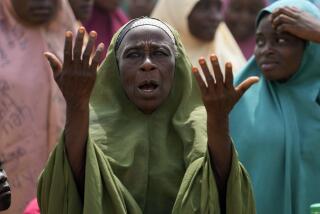Secret Student Societies Blamed for Terrorizing Nigeria’s Universities
LAGOS, Nigeria — Firebombings, bloody gang battles, extortion rackets. Across Nigeria, these are part of campus life at universities terrorized by student members of violent secret societies.
At least 20 killings in the last two years have been blamed on the dozen or so groups, among them Black Ax, the Buccaneers and the Green Berets.
Society members fight rival gangs and prey upon professors and students who are not members. The societies have been blamed for rapes, extortion, assaults and arson attacks and are widely considered the most serious problem facing Africa’s largest university system.
Critics claim authorities sometimes shy away from tough action because many members of the groups are from wealthy families, but there have been some crackdowns.
More than 500 students at Nigeria’s 39 universities have been expelled in the last five years for activities related to the secret societies. In July, seven students at the University of Ibadan were charged with killing two students in a gang fight, and three students at the Bida polytechnic university received three-year jail terms for secret-society activities.
Obi Nwankama, a leading writer and journalist, joined one of the first secret societies, the Pirates, in the 1980s while a student at the University of Jos in northern Nigeria.
He said that at the time, the group was approved by university officials and was open only to students whose marks were above their class average.
“There was never anything secret about our fraternity,” said Nwankama. “It was essentially a counterculture--a romanticized version of sea pirates of old.”
Nwankama said the Pirates were formed mainly out of a desire to promote more academic freedom and also to correct societal ills.
He said part of the blame for the rising violence rests with Nigeria’s military government because it banned politically active student unions and put undercover agents on campus.
“These agents militarized the consciousness of the undergraduates,” Nwankama said. “And when the government destroyed unions on the campus, undergraduates began to associate not on the ideals of scholarship, but on a new set of values.”
Other academics blame the violence on a general erosion of moral standards.
“When society witnesses developments as we have had in Nigeria, cultures break down and people begin to look for substitutes for the vacuum being created,” said P.B. Ogunlade, a sociology teacher at the University of Lagos.
A law professor at Lagos State University, Mike Ikhariale, said he was too scared to discuss the societies.
“It’s no longer safe for me to comment on the activities of secret cults on either my campus or any other,” he said.
His fear is understandable. In June, a firebomb wrecked the office of an administrator at the University of Calabar who had been trying to rein in the secret societies.
Reasons for joining the groups appear little different from those of students who join fraternities and sororities at universities in other countries.
Thomas Lawal, a student at the University of Technology in Akure, said he was seeking a sense of identity--and security--when he joined a secret society two years ago.
But in early July, Lawal renounced his membership at a forum organized by university officials. He gave a chilling account of initiates being buried in the bush after dying in secret rituals.
Another group’s initiation ritual was depicted recently in the Lagos Tribune. It described a recruit at Adoekiti University walking into a circle of about 40 drunken members, holding out his left arm to be slashed by a knife, then letting his blood drip into a calabash.
To an extent, the groups are all an offshoot of the Pirates, formed in 1952 by a group of idealistic students at the University of Ibadan.
Its founders, including Wole Soyinka, a Nobel laureate in literature, sought to promote more academic freedom and social awareness on campus. Now in political exile, Soyinka has denounced the trend toward campus violence.
“The Pirate ship has gone aground,” he said.
In the early 1970s, a splinter group that wanted to be more radical broke away from the Pirates to form what became the Buccaneers. The breakup triggered violence, and more gangs began to appear.
This year alone, gang rivalries have led to deaths on at least seven campuses. Four people died in two clashes at Lagos State University. At the University of Benin in western Nigeria, the gangs have been blamed for six killings and a fire that burned down the computer department building.
Jelili Omotola, vice chancellor of the University of Lagos, wants college officials to regain the power to select students for admission. Now, a central board decides on admissions to all 39 universities.
“There is need for the university to know the kind of people it is admitting,” Omotola said.
More to Read
Sign up for Essential California
The most important California stories and recommendations in your inbox every morning.
You may occasionally receive promotional content from the Los Angeles Times.










